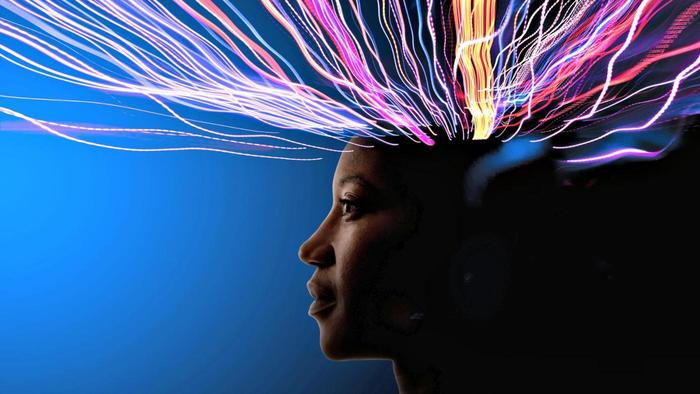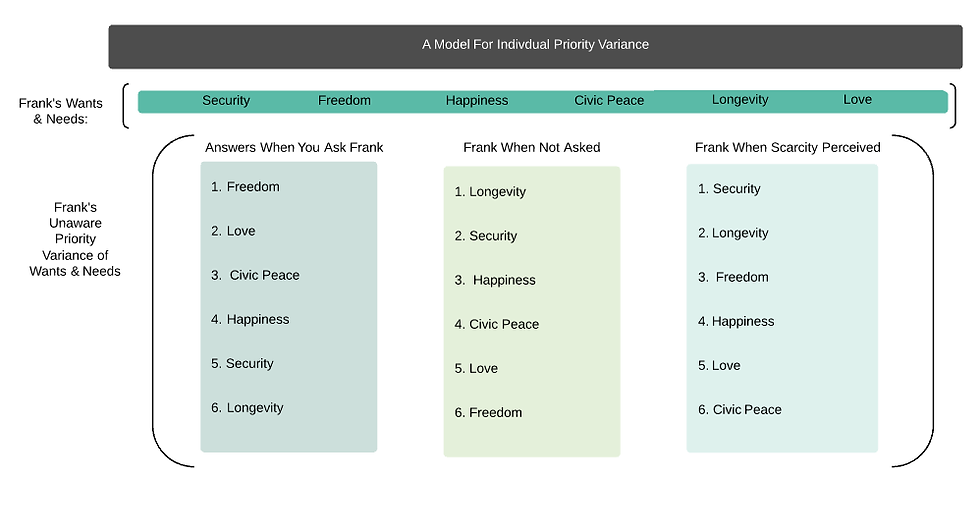A Mechanical Model Explaining Universal Human Commonalty & Priorities Variance
- Kevin

- Nov 19, 2016
- 4 min read
Updated: Sep 3, 2025

I have two models to explain human behavior and variance:
The first model explains variance in values while remaining universal across cultures and within them.
The second model explains how within an individual our values rotate depending on the circumstance.
The human brain organizes thoughts in number sequence through words that we process, one at a time. When we meet someone, we remember them in an order of words.
Lets call our subject Frank. We can view Frank from two perspectives depending on our judgement of him.
We might remember and perceive Frank with this word order:
Frank
Smart
Nice
Messy Hair
Sometimes Dishonest
...or we might remember and perceive Frank in this word order:
Frank
Sometimes Dishonest
Messy Hair
Nice
Smart
The Butterfly Effect. Frank is the same person no matter what word order we remember him with, but the perspectives we choose not only greatly impact Frank. They also impact his opportunities through us and his ability to function around us depending on the intensity of his empathy.
The human brain is on average weak in resisting its desire to defend the body it inhabits by reacting very differently to the same person through the lens of a different perspective. Sometimes we assume one of the two above word order lists to view a person based on previous experiences that trigger defensive stimulus in our brain based on arbitrary factors that offer no clue into the facts surrounding a person.
The above has long term vast implications on how we interact with Frank, and what Frank thinks of himself should our interaction be regular. There is always a constant butterfly effect underway in everything we do, every nuance how we treat people, and ever routine experience with the same person we encounter: which is why they say we become the people we are around. It is above us to avoid influencing our DNA and self-view, and in turn how we treat others, as a result of our interactions with those around us.
That is because as I wrote before, the brain operates with a series of thoughtless algorithms that train on data and alter through a backdoor our consciousness, out of plain sight of the aware part of our brain.
See:
1. "The Human Brain Learns From A Machine Learning Algorithm: Human's Are Data-Driven Biological Robots"
The First Model: Universal Values With Variance Across Socialized Cultures in Priorities.

Yes. We All Want the Same Things... Just Not Always in the Same Priority Order. It is fact that the above priorities vary from culture to culture, and also from person to person. Not everyone wants to be free in order to be happy, and not everyone defines the purpose of the opposite sex to be love. Hollywood film wrongly teaches us that we all want the same things. We do, but not exactly in the same order... really... This is not about simple perspectives, but really deep down in what order we want them: something not changeable through a talk or a quick read of this essay.
The Second Model: Individual Variance... The Same Person Switching Priorities

The words in the priorities list in both models above are not meant to estimate what words one might prioritize. They are illustrative only.
When a person is asked what their priorities are they will give you one answer, but then act on another. They did not lie to you, however. They are unaware of the cognitive dissonance inherent in the brain self-preserving itself. This variance is completely normal.
Human beings are hardwired for survival purposes to belong to a group, and not aware but unaware we give answers to help us belong to that group. We must not be angry with people for being within some limit of variance hypocritical, as this is the brain defending itself after a series of algorithms in the brain trained to produce this behavior for its learned perception of what needs to be done to survive. Failing to be angry does not mean we have to tolerate. Actions are recommended to defend yourself against the inconsistent.
After having learned partially two completely different languages, Korean and English, and after having moved around more than 10 times in my life to new places, culturally and geographically, I have come to a few personally life derived hypotheses to always explain human behavior. I hope you find the above organically derived hypotheses helpful in bringing peace to yourself, as it does to me. It humbles me to be aware of what little control I have over the operations of my own brain, and it empowers me with grace to handle others the same. I hope you find that same benefit.
To observe the above reality in real time through a gradual integration of it through habit will increase ones "Awareness Intelligence", a concept this author loosely defines throughout the content of this blog.


Comments